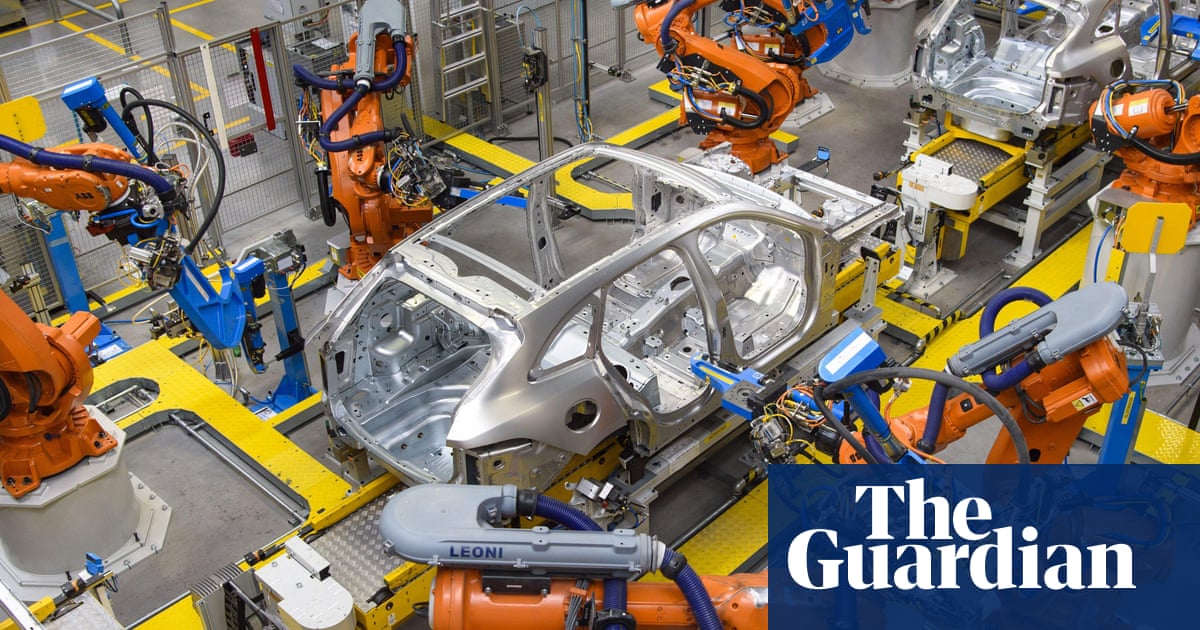Shiploads of Minis, Aston Martins and Range Rovers will set sail for the US on Monday as the UK-US trade deal kicks in, but British farmers say they have been used as collateral to save the car industry.
Auto shipments across the Atlantic were down more than half in May after Donald Trump’simposition of a 25% tariffon 3 April on top of an existing 2.5% levy.
However, as of one minute past midnight US time on Monday – 5am in the UK – that has been reduced to 10% for cars, and UK manufacturers expect pent-up demand to be unleashed.
Aston Martin’s chief executive, Adrian Hallmark, said the luxury carmaker had stopped shipping between April and June, something he said had been “not catastrophic, but slightly uncomfortable”.
The outline of the trade deal wasagreed between Trump and Keir Starmer in early May, the first such bilateral pact to mitigate the president’s import taxes. However, delays in agreeing the fine print meant the higher tariff had continued to apply, pushing the cost of British cars up by more than a quarter for US importers.
Hallmark told a British car industry conference last week that he was “planning to invoice three months’ worth of sales in a 24-hour period”, with stocks in the US down by 50% due to the pause.
Aston Martin exports 90% of its cars, but its customers are wealthy and were willing to wait. “The demand has been strong and will be in good shape when we start to invoice cars like fury on Monday next week,” he said.
On the eve of the trade deal coming into force, the business secretary, Jonathan Reynolds, received reassurancesfrom the sportscar maker Lotusthat it had no plans to close its UK factory, in Hethel, Norfolk.
Reynolds contacted Lotus bosses after it emerged that the carmaker wasconsideringshifting production to the US – a move that would jeopardise 1,300 jobs.
A Department for Business and Trade spokesperson said Reynolds met Lotus and its owner, Geely, on Sunday to clarify the company’s situation, and “was reassured by management that they are committed to their UK operations and have no plans to close their Hethel plant”.
A decision to relocate manufacturing abroad by a prestige brand such as Lotus would be embarrassing for the UK government. Labour’s industrial strategy, published last week, singled out automotive production as among the strategic sectors it wants to support.
The car industry welcomed the US-UK trade deal when it was struck, with itpreventing job losses at JLR, the maker of the Jaguar and Land Rover brands. Range Rovers are particularly popular in the US.
However, the lower 10% duty only applies to a quota of 100,000 cars a year – slightly below last year’s export numbers – leaving little room for growth. JLR alone exported 84,000 cars in the year up to April 2025.
The initial trade deal also included a promise of zero tariffs on steel but this has been held up bynegotiations over the origin of some raw materials for smelting, particularly at Tata’s plant at Port Talbot in south Wales.
Concessions were won with new tariff-free quotas for British and US beef in each other’s markets, as well the controversial removal of a 19% tariff on American ethanol imports, which the UK industrysays leaves biofuel plants facing closure.
Sign up toBusiness Today
Get set for the working day – we'll point you to all the business news and analysis you need every morning
after newsletter promotion
The president of the National Farmers’ Union, Tom Bradshaw, said the government must stop using agriculture as a bargaining chip in talks and urged Starmer to take the sector off the table in the talks on steel and remove the 10% baseline tariff Trump has applied to all imports.
“Agriculture has borne the responsibility of removing tariffs for other sectors. At some point they’ve got to stop relying on agriculture to take the burden,” Bradshaw said. “Agriculture has nothing left to give.”
On the upside for farmers, they can now sell 13,000 tonnes of British beef to the US, but again there is a catch. They will not be able to sell until January next year because beef is part of a wider tariff deal with other countries, and this year’s quota has already been filled by Brazilians who stockpile beef in storage near the Mexican border.
The UK steel industry has at least won a temporary exemption from the50% tariff imposed by Trump at the start of this monthuntil 9 July, but it still faces a 25% tariff on exports. It is waiting anxiously for delivery of the promised zero rate tariff.
“Time is running out to secure a UK-US steel deal and remove damaging tariffs,” said Gareth Stace, the director general of UK Steel.
“Every day of delay costs our steelmakers dearly. Contracts are being lost, investment decisions remain on hold, and uncertainty is paralysing business decisions. We urgently need a swift, positive resolution to these talks to protect jobs, unlock growth, and restore confidence in the sector.”
Yet even in a zero-tariff deal, Port Talbot may still face issues. The UK operations of the Indian conglomerate are relying on imports of steel melted and poured in its sister plants in India and the Netherlands while they move from a polluting blast furnace to the greener electric arc furnace to smelt steel.
However, UK Steel is hoping there can be an exception to the tariffs agreed for the Welsh operation along with the five other plants in the UK. UK trade officials are understood to be optimistic they can secure such an exemption.
